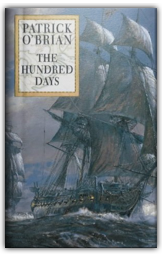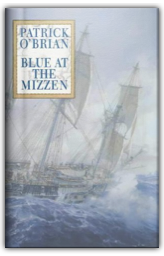 The Hundred Days
Patrick O'Brian
The Hundred Days
Patrick O'Brian
The year is 1815, and Europe's most unpopular (not to mention tiniest) empire-builder has escaped from Elba. In The Hundred Days, it's up to Jack Aubrey—and surgeon-cum-spymaster Stephen Maturin—to stop Napoleon in his tracks. How? For starters, Aubrey and his squadron have been dispatched to the Adriatic coast, to keep Bonapartist shipbuilders from beefing up the French navy. Meanwhile, one Sheik Ibn Hazm is fomenting an Islamic uprising against the Allies. The only way to halt this manoeuvre is to intercept the sheikh's shipment of gold—because in the Napoleonic era, as in our own, even the most ardent of mercenaries requires a salary.
The Hundred Days is the 19th (and, we are told, the penultimate) instalment of O'Brian's epic. Like many of its predecessors, it features a swashbuckling plot, complete with cannon fire, exotic disguises and Aubrey's suspenseful, slow-motion pursuit of an Algerian xebek. Yet it never turns into a mere exercise in Hornblowerism. In part, this is due to O'Brian's delicate touch with character—the relationship between extroverted Aubrey and introverted Maturin has deepened with each book, and even Aubrey's reunion with his childhood companion Queenie Keith is full of novelistic nuance: "They sat smiling at one another. An odd pair: handsome creatures both, but they might have been of the same sex or neither." Nor does the author focus too exclusively on his dynamic duo. Indeed, The Hundred Days is very much a chronicle of a floating community, which Maturin describes as "his own village, his own ship's company, that complex entity so much more easily sensed than described: part of his natural habitat."
Finally, O'Brian shows his usual expertise in balancing the great events with the most minuscule ones. Other authors have written about battles at sea, and still others have recorded the rapid rise and fall of Napoleon's fortunes after his escape from confinement. But who else would give equal time—and an equal charge of delight—to Maturin's discovery of an anomalous nuthatch? —James Marcus
 Blue at the Mizzen
Patrick O'Brian
Blue at the Mizzen
Patrick O'Brian
Why do the sea-faring adventure novels of Patrick O'Brian enjoy such a phenomenally devoted readership? Actually, O'Brian enthusiasts can take their pick from a variety of qualities of excellence: The sheer command of writing technique; the adroit characterisation of his heroes, every bit as rich and well-rounded as anything in serious fiction; and, of course, the bracingly-realised atmosphere of the sea on which the author sets his tales of derring-do. The latest volume, Blue at the Mizzen, represents an even greater refinement of O'Brian's art.
His long-time protagonist Jack Aubrey is about to achieve his ambition. Unusually, his finances are in good order and his professional life is ship-shape. But as he reaches the upper echelons of the Captain's list, his prospects of gaining that final promotion are in the balance. In the powder-keg revolutionary atmosphere of South America, his shipmate Stephen Maturin is coming to terms with the loss of his wife by throwing himself into the intelligence work he so enjoys. Both men become involved in a series of labyrinthine intrigues, splendidly punctuated by the action that O'Brian delivers so well. And the writing is as non-pareil as ever: "Then came the repeated broadsides: this was not the dumb show of usual practice at divisions, but the shattering din of battle, the flashing stabs of fire, the shriek of each gun's very dangerous recoil, the heady scent of powder-smoke along the decks." Blue at the Mizzen is a treat for lovers of O'Brian and a perfect introduction for those who have not yet read him. —Barry Forshaw
|
 The Hundred Days
Patrick O'Brian
The Hundred Days
Patrick O'Brian
 Blue at the Mizzen
Patrick O'Brian
Blue at the Mizzen
Patrick O'Brian
 Made with Delicious Library
Made with Delicious Library












